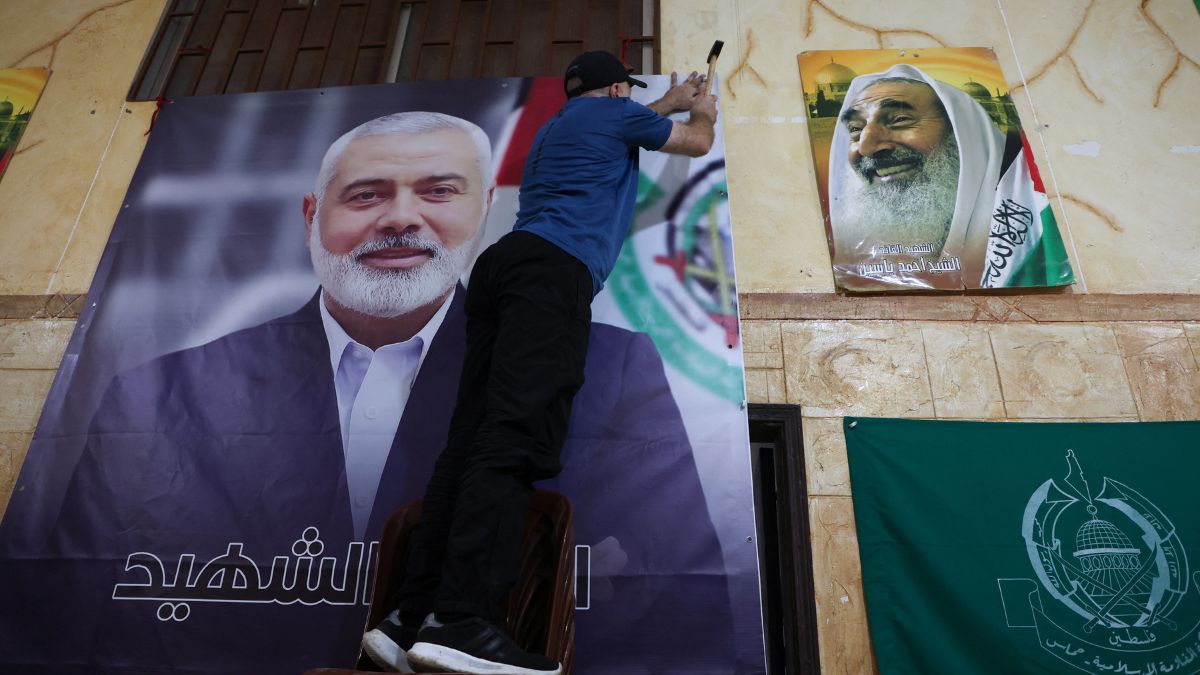Ismail Haniyeh, a key leader of Hamas, was assassinated in Tehran, as confirmed by Iran’s paramilitary Revolutionary Guard early Wednesday. The incident occurred while Haniyeh was in the city to attend the swearing-in ceremony of Iranian President Masoud Pezeshkian.
Although no group has officially claimed responsibility, suspicion has largely fallen on Israel, which has previously vowed to target Hamas leaders following the group’s deadly attack on Israel on October 7. That attack resulted in the deaths of 1,200 people and the capture of approximately 250 hostages.
The death of Haniyeh, a significant figure in Hamas’s political and diplomatic structure, has raised serious questions about the future of ongoing ceasefire negotiations. American officials had recently indicated that these talks, mediated by Qatar, the United States, and Egypt, were close to yielding a temporary ceasefire and a potential hostage release deal.
However, the assassination has cast doubt on the feasibility of these efforts moving forward.
What was Haniyeh’s role in Israel-Hamas negotiations?
Haniyeh was not directly involved in the military operations in Gaza – those responsibilities are reportedly handled by Yahya Sinwar, the military commander of Hamas. Nevertheless, Haniyeh was crucial in the political wing of the organisation, acting as the public face of Hamas’s diplomacy across various Arab capitals.
Based in Qatar since leaving Gaza in 2019, Haniyeh played a pivotal role in international negotiations, shuttling between Turkey, Lebanon, Iran, and Egypt to garner support and mediate for peace.
Impact Shorts
More ShortsHis death marks a significant setback for diplomatic efforts, as he was one of the main interlocutors in the negotiations. Despite his largely symbolic role, Haniyeh’s presence in these talks was vital for maintaining a diplomatic channel.
Analysts have pointed out that the real power within Hamas lies with its Gaza-based military leaders, including Sinwar and Mohammed Deif, the latter of whom was r eportedly targeted in an Israeli assassination attempt earlier in July.
How can Haniyeh’s death impact ceasefire negotiations?
The timing of Haniyeh’s assassination comes amidst a critical juncture in the Israel-Hamas conflict. Just a few days before his death, both Israel and Hamas blamed each other for the stalled progress in reaching a ceasefire and hostage release deal.
According to a statement from Hamas, Israeli Prime Minister Benjamin Netanyahu had introduced new conditions and demands, deviating from a US-backed truce proposal that had been the basis for recent negotiations.
Netanyahu, however, denied these accusations, stating that it was Hamas that had made numerous changes to the original proposal. “Israel is sticking by its principles according to the original proposal - a maximum number of hostages (to be freed) who are still alive, Israeli control of the Philadelphi Corridor (along the Gaza-Egypt border), and preventing the movement of terrorists and weapons to the northern Gaza Strip,” a statement from his office had read.
This conflicting narrative has led to a deadlock, despite assertions from mediators like Qatar and Egypt, supported by the US, that doors to further negotiations remain open.
Also Read | Gaza ceasefire deal 'unlikely' as Israel refuses to budge on conditions: Report
Hamas, for its part, accused Netanyahu of “procrastination, evasion, and avoiding reaching an agreement by setting new conditions and demands.”
Senior Hamas political official Izzat El-Reshiq said that his group had shown “flexibility and positiveness” and had worked to overcome Israeli obstacles, but Netanyahu’s introduction of new “impossible” conditions had hindered progress.
Why target Haniyeh?
The question that remains is if this was indeed an operation by Israel, then why target the Hamas leader who was key in the ongoing negotiations?
Turkey’s foreign ministry accused Netanyahu of having “no intention of achieving peace.”
“How can mediation succeed when one party assassinates the negotiator on other side?” – That was the response from Qatar’s Prime Minister Mohammed bin Abdulrahman Al-Thani, a mediator on the Israel-Hamas talks, to the new of the assassination, on X. Qatar’s capital Doha hosts the main Hamas political bureau.
“Political assassinations & continued targeting of civilians in Gaza while talks continue leads us to ask, how can mediation succeed when one party assassinates the negotiator on other side?,” he wrote. “Peace needs serious partners & a global stance against the disregard for human life,” he added.
Political assassinations & continued targeting of civilians in Gaza while talks continue leads us to ask, how can mediation succeed when one party assassinates the negotiator on the other side? Peace needs serious partners & a global stance against the disregard for human life.
— محمد بن عبدالرحمن (@MBA_AlThani_) July 31, 2024
Peter Ricketts, the UK’s former national security adviser, told BBC that the assassination serves as “a very powerful demonstration of Israel’s ability to reach out right across the region.”
He added that this might provide Israel with the “political room to begin now to wind down the operation in Gaza because [Netanyahu] can now say he has really delivered a major blow against Haniyeh’s leadership.”
Also Read: After Ismail Haniyeh’s assassination, which Hamas leaders remain?
However, Ricketts also warned that this remains “a very dangerous time in the Middle East,” as Hamas is now less likely to engage in ceasefire talks following the assassination. Hamas official Sami Abu Zuhri described the killing as a “grave escalation that will not achieve its goals,” underscoring the potential for increased violence and instability in the region.
With inputs from agencies


)

)
)
)
)
)
)
)
)



